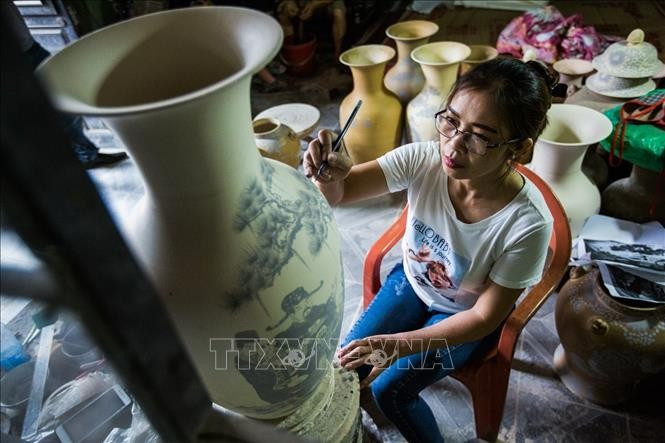
A worker creates patterns for Bat Trang ceramic products. (Photo: VNA)
Home to the highest number of craft villages in the country, with 47 out of the 52 traditional crafts, Hanoi is striving to become a pioneer in exporting One Commune One Product (OCOP) items.According to Tran Duc Tan, Director of the Tan Thing pottery production and trading cooperative – whose OCOP products have been rated five-star, the cooperative gathers 20 members, all skilled artisans from Bat Trang, a traditional pottery village with over 500 years of history. Each member specialises in a different pottery line, now working together to develop a shared brand.
Being rated as a five-star OCOP product is a great honour for Tan Thinh’s ceramic glaze collection, he noted. This can be considered a ‘passport’ for the firm to strengthen and expand its brand in both domestic and international markets. Currently, Tan Thinh ceramics are present in Germany, France, Japan, the Republic of Korea, and beyond.
Previously, the Quang Vinh ceramic limited company from Bat Trang had four products recognised by the Ministry of Agriculture and Environment as OCOP five-star – the first such products in the capital.
Nguyen Thi Kim Que, Director of the Hanoi Agricultural Extension Centre, said that over the past five years, the city has consistently been accredited by the central government as the country’s leader in implementing the OCOP programme. By the end of 2024, Vietnam had nearly 15,000 certified OCOP products, of which Hanoi accounted for 3,317 or 22.1% of the national total. Six products from the capital have been awarded five-star OCOP status, ranking among the top nationwide.
According to Vu Van Dinh, a well-known handicraft producer in Phu Xuyen, Hanoi, since associating his products with the OCOP programme, his production facility has become more aware of quality, design, and the cultural stories behind each item. With support from the local and municipal authorities in promotion and trade facilitation, its craft products have reached more customers, especially in the premium giftmarket.
Ta Van Tuong, Deputy Director of the municipal Department of Agriculture and Environment, noted that the development of traditional craft villages has created jobs and income opportunities for locals. Not only those of working age but also the elderly and people with disabilities have found suitable employment, contributing to their family’s income.
Currently, about 100 craft villages in Hanoi earn annual revenues between 10 billion VND (379,075 USD) and 20 billion VND, nearly 70 villages earn 20 – 50 billion VND, and around 20 generate more than 50 billion VND, making significant contributions to local budgets.
The stable development of local craft villages has been delivering increasing economic benefits, contributing positively to rural economic restructuring and development. Their production value now exceeds 24 trillion VND, creating jobs for tens of thousands of rural workers with an average income of 4 – 5.5 million VND per month, much higher than that of traditional farming.